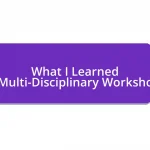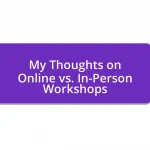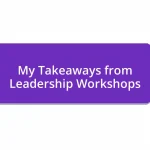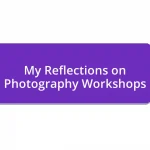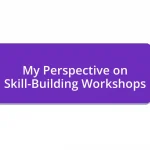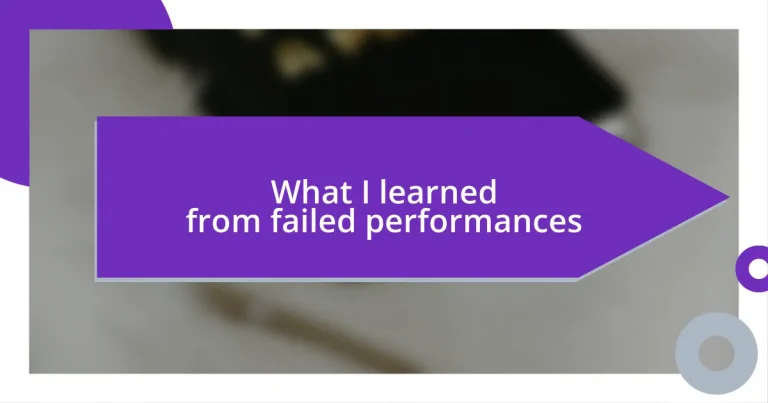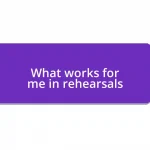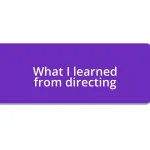Key takeaways:
- Performance failures are valuable learning experiences that foster resilience, creativity, and personal growth.
- Key reasons for failures include inadequate preparation, overconfidence, technical issues, nervousness, and poor time management.
- Reflection, setting achievable goals, and seeking feedback are crucial strategies for improvement after setbacks.
- Building resilience involves embracing vulnerability, shared experiences, and transforming failures into opportunities for creativity.
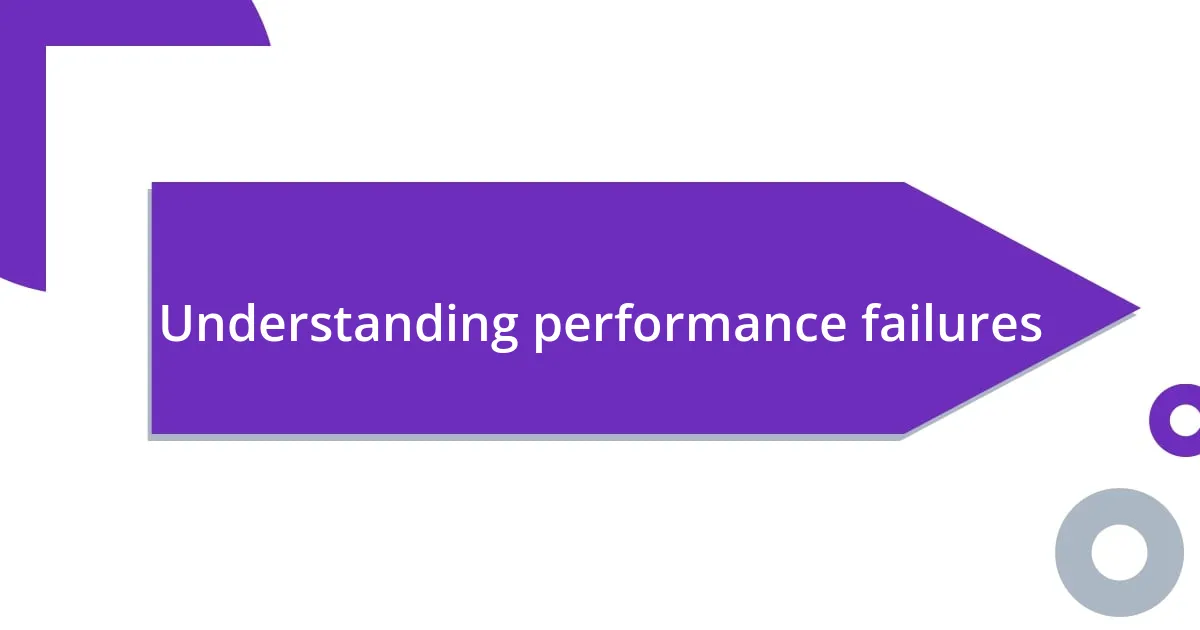
Understanding performance failures
Understanding performance failures can feel overwhelming, but I’ve learned they often serve as crucial learning opportunities. For instance, I remember a presentation where my nerves got the better of me, and I stumbled over my words. It was a humbling experience that made me realize just how important preparation and practice are, especially when the stakes are high.
Have you ever faced a moment where everything seemed to go wrong? I certainly have. One time, during a live performance, the sound system failed just minutes before I was set to go on stage. Feeling the weight of disappointment was tough, but it opened my eyes to the importance of contingency plans. Failure doesn’t mean the end; rather, it can be a catalyst for resilience and creativity.
Moreover, I’ve come to understand that failure often reveals deeper truths about our motivations and skills. After a failed project, I took time to reflect on my approach and genuine interest in the subject matter. That moment was both painful and enlightening, affirming my belief that each setback can pave the way for much-needed growth. Why do we shy away from embracing these moments? Because they challenge us in ways we sometimes aren’t ready for.
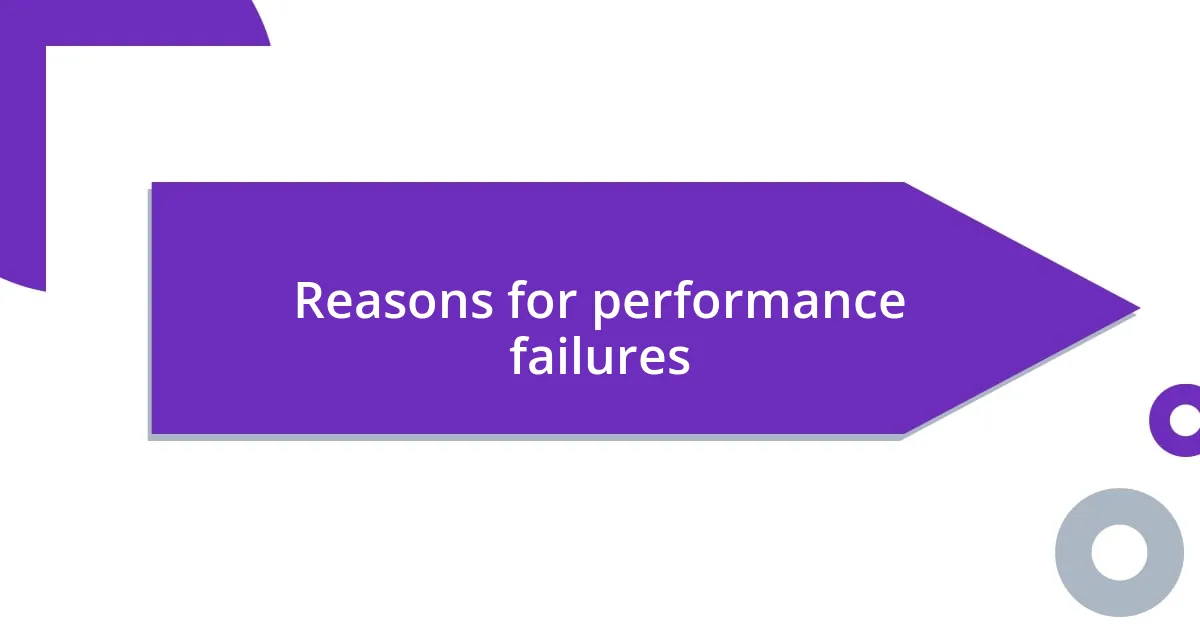
Reasons for performance failures
When I think about the reasons for performance failures, a few key factors consistently come to mind. One instance stands out vividly: during my first major public speaking gig, I forgot a significant portion of my speech. This wasn’t just a lapse in memory; it stemmed from a lack of in-depth preparation and overconfidence. The experience taught me that being well-prepared isn’t just advisable, it’s essential.
Here are some common reasons I’ve identified behind performance failures:
- Inadequate Preparation: Like I experienced, not rehearsing enough can lead to unexpected mistakes.
- Overconfidence: Sometimes, I felt too sure of myself, which made me lax in my approach.
- Technical Issues: Just as the sound system crashed on me one time, tech problems can derail even the best performances.
- Nervousness or Anxiety: There are times when my nerves took control, leading to shaky delivery.
- Poor Time Management: Failing to allocate sufficient time for practice or setup can create unnecessary pressure.
Each failure carries a lesson. I now see each setback as an opportunity to dissect what went wrong and improve for next time.
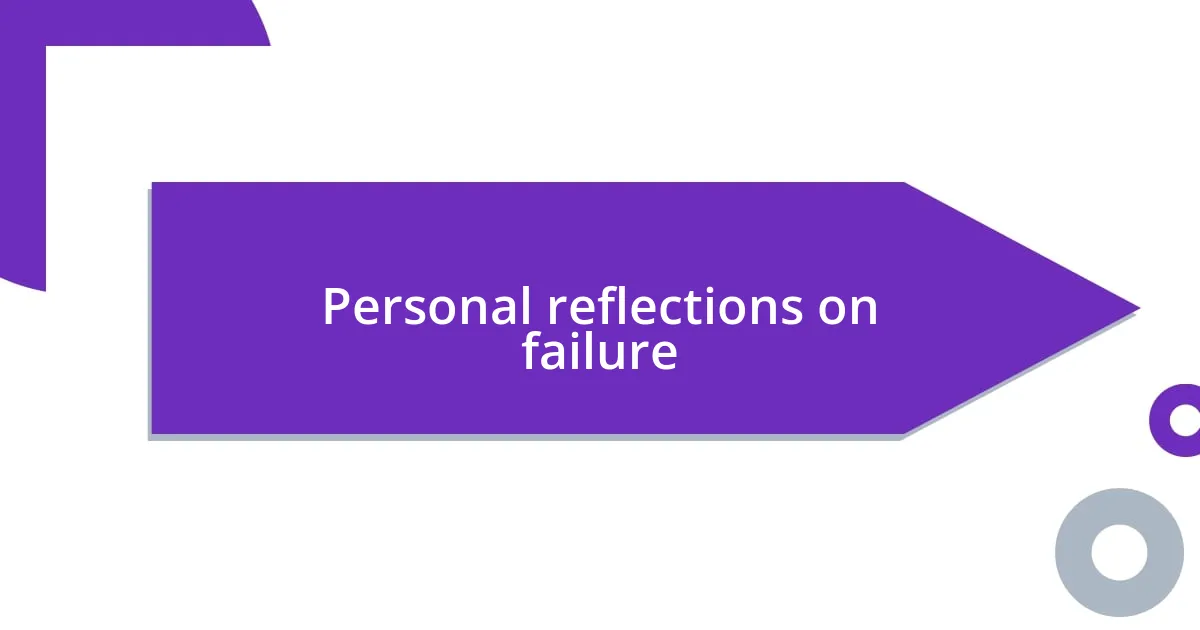
Personal reflections on failure
One of the most eye-opening moments I experienced during a failure came when I participated in a talent show. I confidently showcased my singing skills, but I completely blanked on the lyrics to my favorite song midway through. That sinking feeling in my stomach was gut-wrenching. However, this failure made me realize how vital mental preparation and self-awareness are. I learned that even our passions can falter without the right mindset.
Reflecting on my failed art exhibit, I discovered that I had focused too much on technical perfection rather than expressing my genuine feelings. It was enlightening to see how I had been chasing validation rather than creating what truly resonated with me. Engaging with my emotions in art became a transformative lesson in authenticity. Have you ever felt that nagging pressure to impress? Embracing vulnerability in creativity changed my perspective dramatically.
In moments of failure, I’ve often found myself at a crossroads between disappointment and introspection. After a botched performance where I fumbled several key notes, I took to journaling to process my feelings. In those quiet moments, I uncovered patterns in my anxiety, which helped me navigate similar situations in the future. It’s remarkable how examining our failures can lead to profound personal revelations and growth. How can we shift our perception of failure to see it as a stepping stone instead of a stumbling block?
| Type of Failure | Lesson Learned |
|---|---|
| Lyric Mishap | The importance of mental preparedness |
| Art Exhibit | Value of authenticity over perfection |
| Botched Performance | Insight through reflection and journaling |
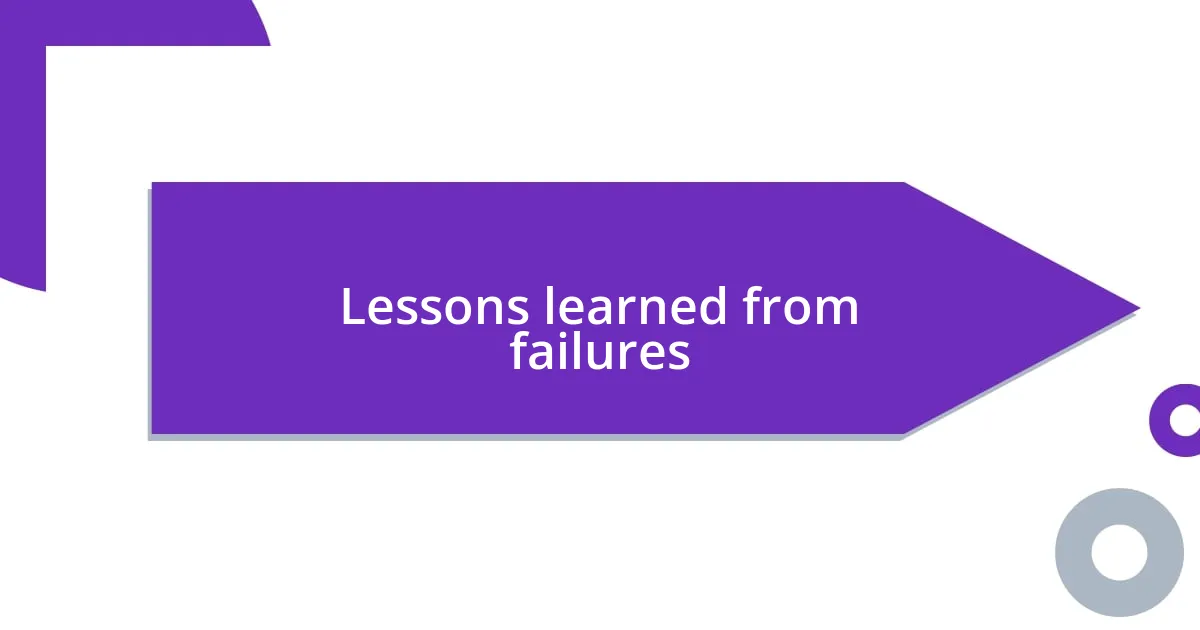
Lessons learned from failures
Reflecting on my failed performances, I discovered that vulnerability is a powerful teacher. One unforgettable night, I attempted to perform a dramatic monologue. Instead of pouring my heart into the character, I became preoccupied with how I appeared on stage. When the audience’s laughter caught me off-guard, I realized that I had missed the emotional connection I wanted to create. Have you ever felt the weight of judgment overshadow your creative expression? That experience prompted me to focus on embracing vulnerability, which ultimately brings authenticity to my performances.
Another lesson that sticks with me is the crucial role of feedback. There was a time I nervously presented a project and utterly tanked the Q&A part. The questions felt like arrows, piercing my confidence. Afterward, I took a deep breath and asked for constructive criticism. Understanding my weak spots through others’ perspectives lid a light bulb moment for me. Have you ever shied away from feedback, fearing it might hurt? I’ve learned that the insights I gain from constructive criticism fuel my growth and resilience in the spotlight.
Finally, I’ve realized that emotional resilience is built through acceptance of failure. After a particularly rough gig where my guitar strings broke, I was left feeling embarrassed and defeated. Instead of wallowing, I chose to look back and consider what led to that moment—did I check my equipment thoroughly? This shift in mindset changed everything. Instead of taking my failures personally, I now view them as growth opportunities. Do you accept failure as a part of your journey? Embracing it can reshape your approach and inspire resilience in the face of challenges.
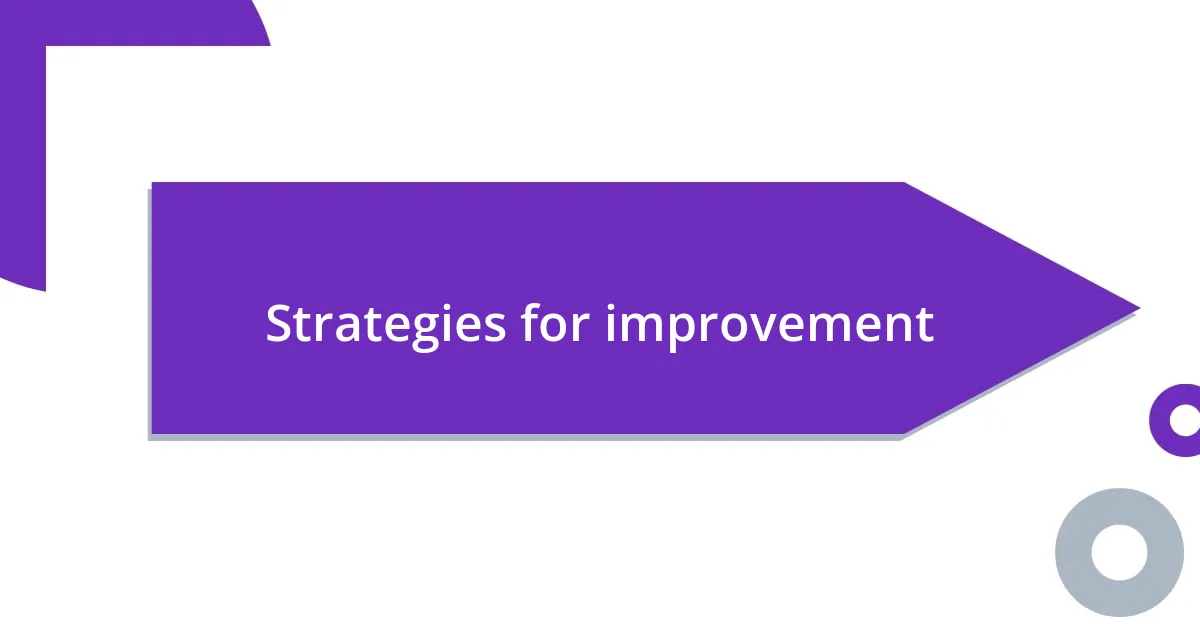
Strategies for improvement
The first strategy I found effective is creating a structured reflection process after each performance. For instance, I started setting aside time to sit with my thoughts, allowing myself to feel any disappointment without judgment. This practice prompted me to ask, “What could I have done differently?” and “What did I learn?” Surprisingly, this simple ritual transformed my failures into constructive lessons, helping me pinpoint specific areas for improvement.
Another essential strategy is setting small, achievable goals for future performances. After experiencing a setback during an acting audition, I shifted my focus to mastering one element at a time, like emotional delivery or voice modulation. This shift in approach made all the difference. Now, when I perform, I ask myself, “What’s my one goal for today?” This targeted focus reduces overwhelm and builds my confidence as I tackle each performance piece by piece.
Lastly, I’ve found that surrounding myself with a support network is invaluable. After a particularly disappointing poetry reading, I reached out to fellow artists who understood my struggle and were eager to share their experiences. Through their stories, I learned I wasn’t alone in facing setbacks. I now frequently ask myself, “Who can I lean on?” This connection not only inspires me but helps cultivate resilience, enabling us to share insights and strategies to improve together. How powerful is it to know we’re in this journey collectively?
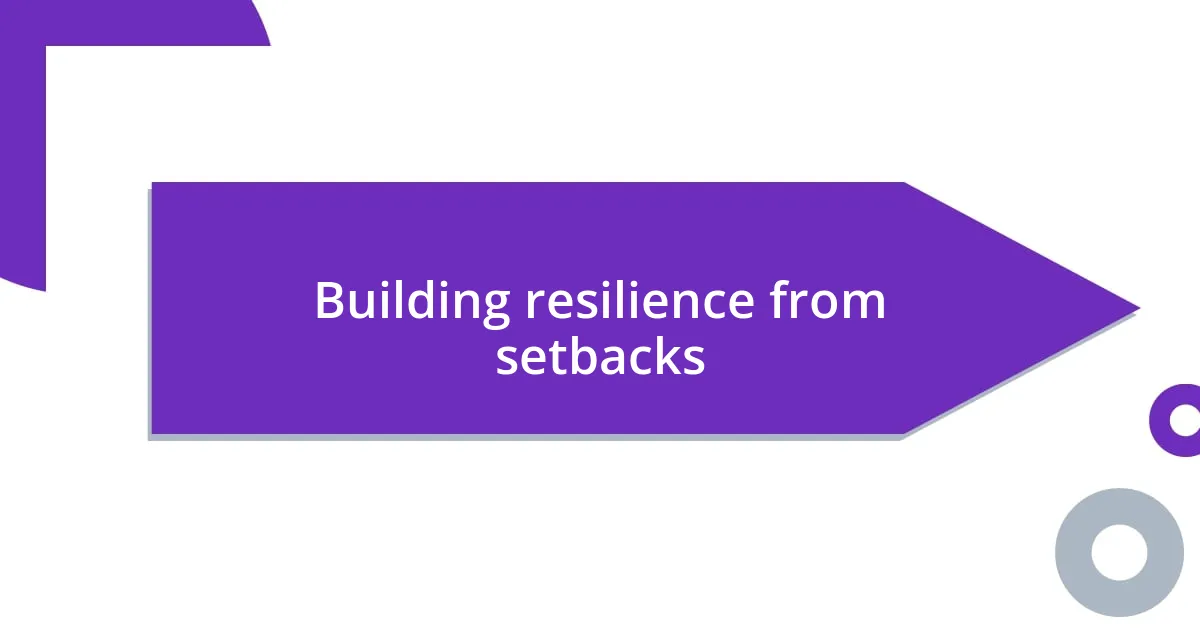
Building resilience from setbacks
Building resilience from setbacks involves a deep understanding of my emotional landscape. I remember one performance where I missed a cue and felt the world slip away in that moment. Instead of focusing solely on the mistake, I asked myself how I could take this setback and turn it into fuel for my growth. Can you relate to that feeling of wanting to crawl under a rock? I learned that sitting with those uncomfortable emotions can help you process and move forward, turning vulnerability into strength.
Another striking realization came when I encountered an unexpected stumble during an open mic night. My mind raced with self-doubt as I stood frozen on stage, completely forgetting my lines. Later, reflecting on this moment, I understood that resilience isn’t just about facing failure—it’s about allowing myself to feel and then consciously choosing to get back up. Have you ever found yourself paralyzed by fear? This experience taught me that setbacks are a part of the journey, and each time I rise, I build a little more resilience.
I’ve also found comfort in shared experiences. After a painful misperform, I reached out to a close friend who shared her own similar story, and it struck me how universal our challenges are. This connection made me realize that discussing our failures isn’t a sign of weakness; it’s a bridge to resilience. Do you confide in others about your setbacks? I now often find support not just in criticism but in camaraderie, where resilience blooms through shared understanding and mutual encouragement.
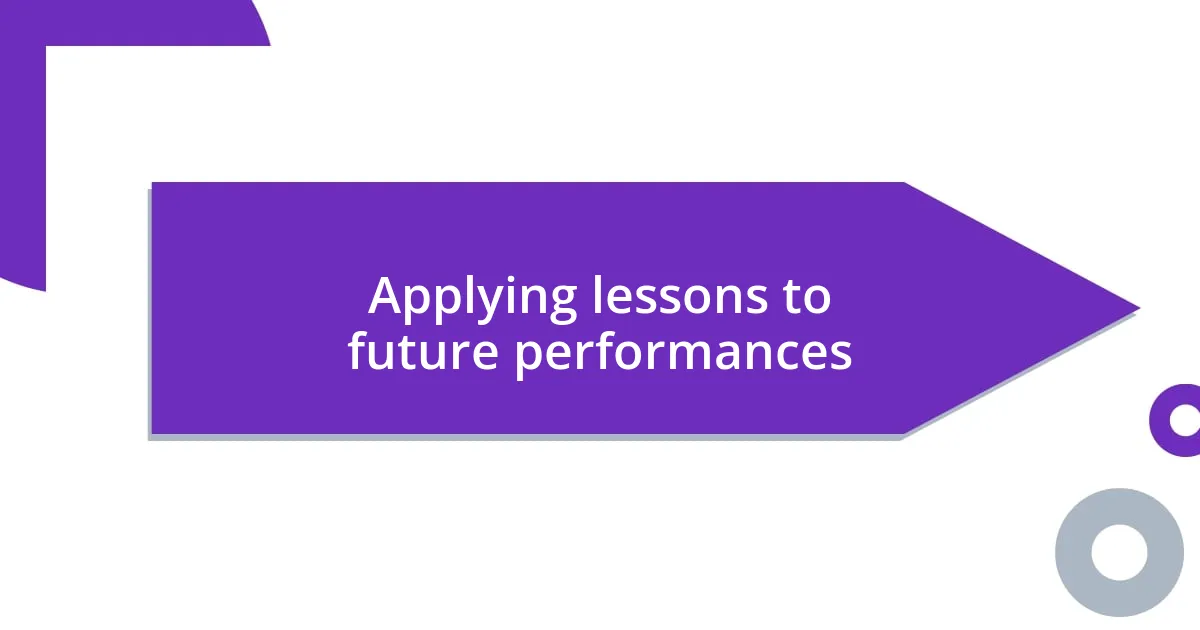
Applying lessons to future performances
Applying the lessons learned from past performances has been invaluable in shaping my approach to future endeavors. I vividly remember a time when I flubbed a dance routine on stage. Initially, my instinct was to wallow in embarrassment. However, I quickly shifted gears and wrote down every misstep I made during the performance. This exercise not only highlighted areas for improvement but also made me realize that this was just one moment in a much larger journey. Have you ever had a misstep that shifted your perspective entirely?
I’ve also come to appreciate the power of visualization after a less-than-stellar performance. Before my next show, I spent time visualizing each move and my emotions throughout the piece. This mental rehearsal built my confidence significantly. It’s fascinating how our minds can prepare us better than we often realize. Have you ever tried visualizing your performance? It was a game-changer for me, reinforcing the idea that preparation and mindset are just as critical as the physical act of performing.
Finally, I’ve learned to treat setbacks as opportunities for creativity. After a comedic skit that completely tanked, I pondered how to turn that experience into something humorous rather than devastating. I conceptualized a new routine centered around ‘epic fails,’ sharing my journey with the audience. This approach not only lightened my mood but resonated with others facing their own missteps. Doesn’t it feel freeing to embrace imperfection? Seeing failure as fuel for creative expression has transformed how I approach future performances, infusing each one with humor and authenticity.
